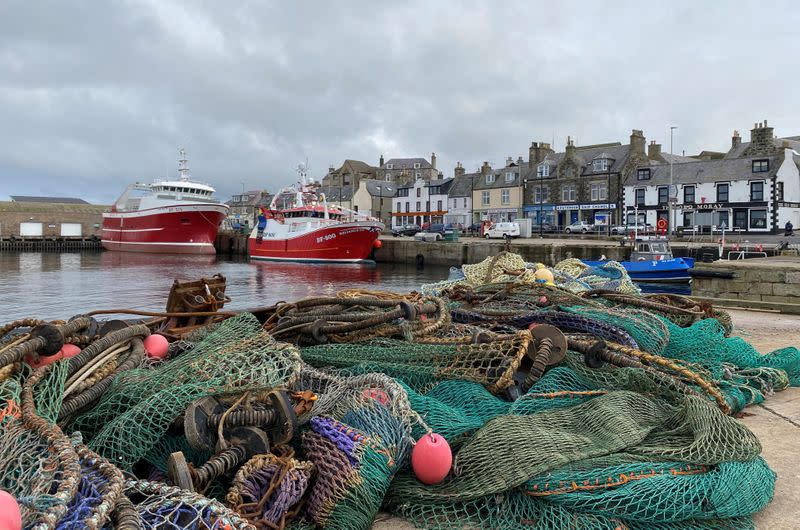By Kate Holton
LONDON (Reuters) – Many Scottish fishermen have halted exports to European Union markets after the post-Brexit bureaucracy broke the system that used to place fresh crayfish and scallops in French stores just over a day after being picked.
Fish exporters told Reuters their business could become unworkable after the introduction of health certificates, customs declarations and other paperwork added days to delivery times and hundreds of pounds to the cost of each cargo.
Businessmen said they tried to send small deliveries to France and Spain to test the new systems this week, but it took five hours to obtain a health certificate in Scotland, a document that is required to apply for other customs documents.
In the first week of work after Brexit, one-day deliveries took three or more days – if they worked.
The owners couldn’t say for sure where their valuable cargo was. A trade group told the boats to stop fishing for exported stocks.
“Our customers are leaving,” Santiago Buesa, of SB Fish, told Reuters. “We are a new product and customers expect to have it fresh, so they are not buying. It is a catastrophe.”
On Thursday night, the largest logistics provider in the Scottish fishing industry, DFDS Scotland, told customers that it had taken the “extraordinary step” to stop export grouping by Monday, when several product lines are transported, to try to fix IT problems, paperwork errors and delays.
Scotland harvests large quantities of crayfish, scallops, oysters, lobsters and mussels from sea fishing along its Atlantic coast, which are transported by truck to decorate the tables of European diners in Paris, Brussels and Madrid.
But Britain’s departure from the EU orbit has introduced reams of paperwork and costs that must be completed to transport goods across the new customs border, the biggest change in its trade since the launch of the Single Market in 1993.
Those who trade food and livestock face the most difficult needs, reaching the express delivery of freshly caught fish that used to move overnight from Scotland, via England, to France, before heading to other European markets in a few days.
David Noble, whose Aegirfish buys Scottish fleets to export to Europe, said he would have to pay between £ 500 to £ 600 ($ 815) a day for the paperwork, eliminating most of the profits.
His concern is that this marks more than initial problems, and says he cannot pass on the higher costs of doing business. “I am questioning whether I should continue,” he said.
“If our fish is too expensive, our customers will buy elsewhere.”
CENTURIES OLD MARKET
In the single market, European foods could be processed and packaged in Britain and then returned to the EU for sale. But Britain’s search for a more distant relationship means that its trade agreement does not cover all interactions between the two sides.
Gaps have already appeared on the shelves of French and Irish stores.
Brexit undermined the ties that unite the UK: while England and Wales voted to leave the EU in 2016, Scotland and Northern Ireland remained.
Scottish Prime Minister Nicola Sturgeon used Brexit as part of his argument that Scotland should seek independence.
She said on Friday that exporters were paying a high price, “a special concern for Scotland’s world-class seafood sector”.
Fishermen across the UK accused Prime Minister Boris Johnson of treason after he promised to regain control of British waters. With little new control and little access to customer markets, many are desperate.
Fisheries trade organizations said that errors in filling out paperwork mean that entire shipments are being checked. A French fishmongers union said several seafood trucks had been stopped at Boulogne customs for several hours, or even for a day, due to paperwork problems.
While this is expected to improve over time, and IT problems must be resolved, Seafood Scotland has warned that it could see “the destruction of a century-old market” if it doesn’t.
Fergus Ewing, the Scottish secretary for the rural economy, said it was better to identify and resolve problems in Scotland than hundreds of miles away.
SB Fish’s Buesa, irritated by suggestions that traders were unprepared, said all his paperwork was correct and demanded to know why business leaders were no longer making noise.
He owns the business with his father, has been exporting for 28 years and employs around 50 people. “I’m in the trenches here,” he said. “It’s an impasse.”
($ 1 = 0.7363 pounds)
(Additional reporting by Richard Lough in Paris; Editing by Guy Faulconbridge and Catherine Evans)
